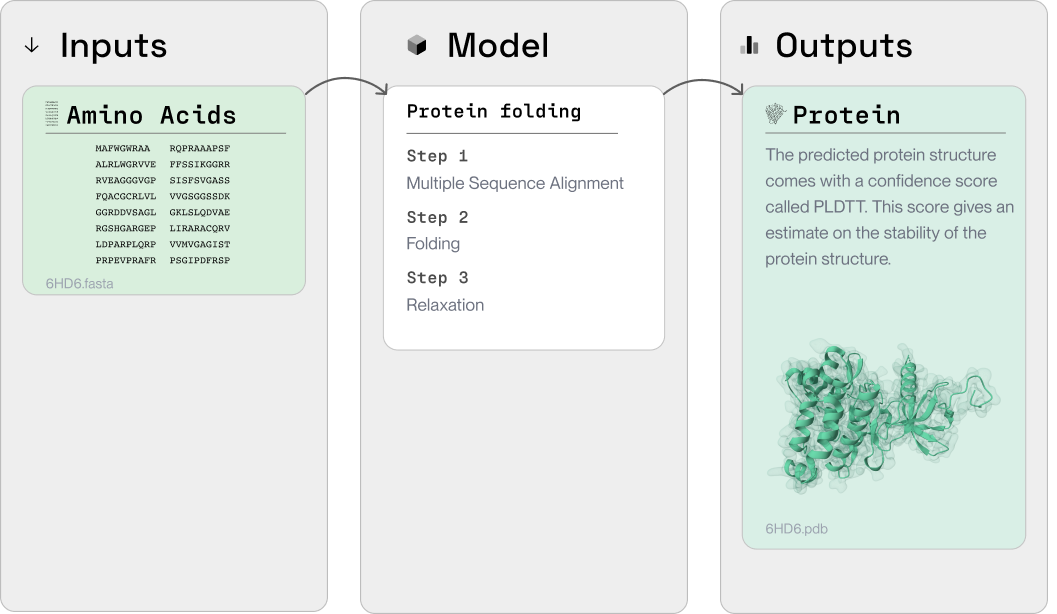Folding proteins with ColabFold
Protein folding in silico
Protein folding is a crucial process in drug discovery. It helps research understand the 3D structure of experimental proteins and identify potential drug targets. With PLEX, predicting a protein's 3D structure from the amino acid sequence is streamlined and efficient.
In this tutorial, we'll walk through an example of how to use PLEX to predict a protein's 3D structure using ColabFold.

Install PLEX
!pip install PlexLabExchange
Collecting PlexLabExchange
Downloading PlexLabExchange-0.8.18-py3-none-manylinux2014_x86_64.whl (26.9 MB)
[2K [90m━━━━━━━━━━━━━━━━━━━━━━━━━━━━━━━━━━━━━━━━[0m [32m26.9/26.9 MB[0m [31m20.1 MB/s[0m eta [36m0:00:00[0m
[?25hInstalling collected packages: PlexLabExchange
Successfully installed PlexLabExchange-0.8.18
Then, create a directory where we can save our project files.
import os
cwd = os.getcwd()
!mkdir project
dir_path = f"{cwd}/project"
Download protein sequence
We'll download a .fasta file containing the sequence of the protein we want to fold. Here, we're using the sequence of Streptavidin.
!pip install requests
import requests
def download_file(url, directory, filename=None):
local_filename = filename if filename else url.split('/')[-1]
with requests.get(url, stream=True) as r:
r.raise_for_status()
with open(os.path.join(directory, local_filename), 'wb') as f:
for chunk in r.iter_content(chunk_size=8192):
f.write(chunk)
return local_filename
url = 'https://rest.uniprot.org/uniprotkb/P22629.fasta' # Streptavidin
fasta_filepath = download_file(url, dir_path)
Requirement already satisfied: requests in /usr/local/lib/python3.10/dist-packages (2.27.1)
Requirement already satisfied: urllib3<1.27,>=1.21.1 in /usr/local/lib/python3.10/dist-packages (from requests) (1.26.16)
Requirement already satisfied: certifi>=2017.4.17 in /usr/local/lib/python3.10/dist-packages (from requests) (2023.5.7)
Requirement already satisfied: charset-normalizer~=2.0.0 in /usr/local/lib/python3.10/dist-packages (from requests) (2.0.12)
Requirement already satisfied: idna<4,>=2.5 in /usr/local/lib/python3.10/dist-packages (from requests) (3.4)
Fold the protein
With the sequence downloaded, we can now use ColabFold to fold the protein.
from plex import CoreTools, plex_create
sequences = [fasta_filepath]
initial_io_cid = plex_create(CoreTools.COLABFOLD_MINI.value, dir_path)
Plex version (v0.8.3) up to date.
Temporary directory created: /tmp/2604ada3-04ec-4d58-9ecc-1e65134c15674117000244
Reading tool config: QmcRH74qfqDBJFku3mEDGxkAf6CSpaHTpdbe1pMkHnbcZD
Creating IO entries from input directory: /content/project
Initialized IO file at: /tmp/2604ada3-04ec-4d58-9ecc-1e65134c15674117000244/io.json
Initial IO JSON file CID: QmUhysTE4aLZNw2ePRMCxHWko868xmQoXnGP25fKM1aofb
This code initiates the folding process. We'll need to run it to complete the operation.
from plex import plex_run
completed_io_cid, completed_io_filepath = plex_run(initial_io_cid, dir_path)
Plex version (v0.8.3) up to date.
Created working directory: /content/project/03ef6ae4-b2ff-424b-894c-05f8fbe48888
Initialized IO file at: /content/project/03ef6ae4-b2ff-424b-894c-05f8fbe48888/io.json
Processing IO Entries
Starting to process IO entry 0
Job running...
Bacalhau job id: ac42f8de-1fea-4e09-9644-75c940bdbd5c
Computing default go-libp2p Resource Manager limits based on:
- 'Swarm.ResourceMgr.MaxMemory': "6.8 GB"
- 'Swarm.ResourceMgr.MaxFileDescriptors': 524288
Applying any user-supplied overrides on top.
Run 'ipfs swarm limit all' to see the resulting limits.
Success processing IO entry 0
Finished processing, results written to /content/project/03ef6ae4-b2ff-424b-894c-05f8fbe48888/io.json
Completed IO JSON CID: QmdnjMsUar6nTqGwgjCwN1Fyjaan4i3zyht9SE9L235YRm
2023/07/20 04:50:10 failed to sufficiently increase receive buffer size (was: 208 kiB, wanted: 2048 kiB, got: 416 kiB). See https://github.com/quic-go/quic-go/wiki/UDP-Receive-Buffer-Size for details.
Viewing the results
After the job is complete, we can retrieve and view the results.
import json
with open(completed_io_filepath, 'r') as f:
data = json.load(f)
pretty_data = json.dumps(data, indent=4, sort_keys=True)
print(pretty_data)
[
{
"errMsg": "",
"inputs": {
"sequence": {
"class": "File",
"filepath": "P22629.fasta",
"ipfs": "QmR3TRtG1EWszHJTpZWZut6VFqzBPWT5KYVJvaMdXFLWXn"
}
},
"outputs": {
"all_folded_proteins": {
"class": "Array",
"files": [
{
"class": "File",
"filepath": "P22629_unrelaxed_rank_1_model_1.pdb",
"ipfs": "QmXZHhB7qP1tnJNyR2TeH7m4gB1R5UF84SzvK94eYB9qdL"
},
{
"class": "File",
"filepath": "P22629_unrelaxed_rank_2_model_4.pdb",
"ipfs": "QmPWGR36mbm5qptniHxd5KjUQKVn8EFMc57DMJzwcetNnU"
},
{
"class": "File",
"filepath": "P22629_unrelaxed_rank_3_model_3.pdb",
"ipfs": "QmXQ1F8xD3TP1qDvU1HDhpuR5JDZvxv1G2udJSdTsimKvH"
},
{
"class": "File",
"filepath": "P22629_unrelaxed_rank_4_model_2.pdb",
"ipfs": "QmV4TZJyWbu4CcmLTvD6nKM8YpzDK4fBsiiA3KQkHjW1RG"
},
{
"class": "File",
"filepath": "P22629_unrelaxed_rank_5_model_5.pdb",
"ipfs": "QmVHT7nQzmNkxDJsRTJPAFqwqhqEgmD3QBGZpUPneogVqX"
}
]
},
"best_folded_protein": {
"class": "File",
"filepath": "P22629_unrelaxed_rank_1_model_1.pdb",
"ipfs": "QmTxVHTSUr8kLa9W8yM7KUNth2pNn8m3x6M18x8yiaV2SU"
}
},
"state": "completed",
"tool": {
"ipfs": "QmcRH74qfqDBJFku3mEDGxkAf6CSpaHTpdbe1pMkHnbcZD",
"name": "colabfold-mini"
}
}
]
The output is a JSON file with information about the folded protein structures. This can be used for further analysis, visualization, and more.